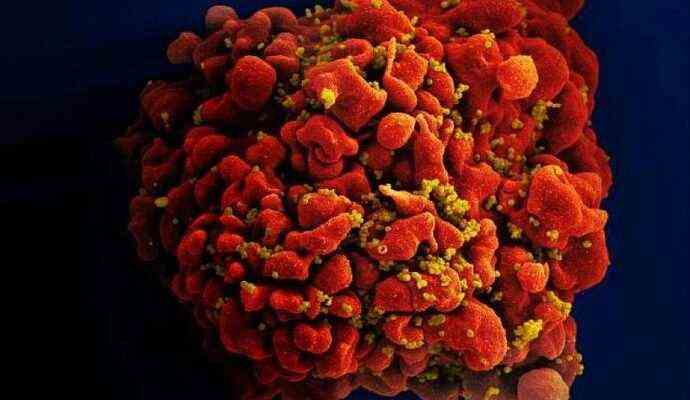A blood cell infected with the HIV virus
An experimental vaccine against HIV has shown promising results in animal experiments, according to US researchers. The vaccine reduced the risk of infection per exposure by 79 percent, according to a US study.
An experimental vaccine against HIV has shown promising results in animal experiments, according to US researchers. The vaccine, which is based on the same mRNA technology as some corona vaccines, has proven to be safe in tests with rhesus monkeys and reduced the risk of infection by 79 percent per exposure, according to the journal “Nature Medicine” on Thursday. published study.
In order to be able to be tested in humans, the vaccine against the HI virus, which can cause the immunodeficiency disease AIDS, has to be further developed. The monkeys received multiple doses of the vaccine over a period of one year, according to the study. Despite the high dosage, the animals would have tolerated the drug well and suffered only minor side effects, such as a temporary loss of appetite.
Antibodies could therefore be detected in all test animals up to the 58th week. From the 60th week onwards, the rhesus monkeys were exposed to the virus on a weekly basis. Since monkeys are not susceptible to the HIV virus, which is dangerous to humans, they were infected with the HIV-like SHIV.
After 13 weeks, according to the researchers, two of the seven primates vaccinated had not become infected with the virus. While the disease broke out in the unvaccinated monkeys after around three weeks, it lasted an average of eight weeks in the immunized animals. “This level of risk reduction could have a significant impact on virus transmission,” the study said.
For the study, scientists from the US National Institute for Allergies and Infectious Diseases (NIAID) worked together with researchers from the US company Moderna, which has also developed a corona vaccine.
“Despite nearly four decades of efforts by the global research community, an effective vaccine to prevent HIV remains a difficult goal to achieve,” said co-author and NIAID director Anthony Fauci. The experimental mRNA vaccine combined several properties that could overcome the shortcomings of previous vaccine candidates and represented “a promising approach”.
Research has made great strides in the fight against the HI virus over the past few decades. While antiretroviral drugs allow infected people to lead a largely normal life, prep drugs taken regularly offer very good protection against infection. To date, however, there is still no effective vaccine. This would be particularly important for poorer countries with poor access to medicines.
HOME PAGE

